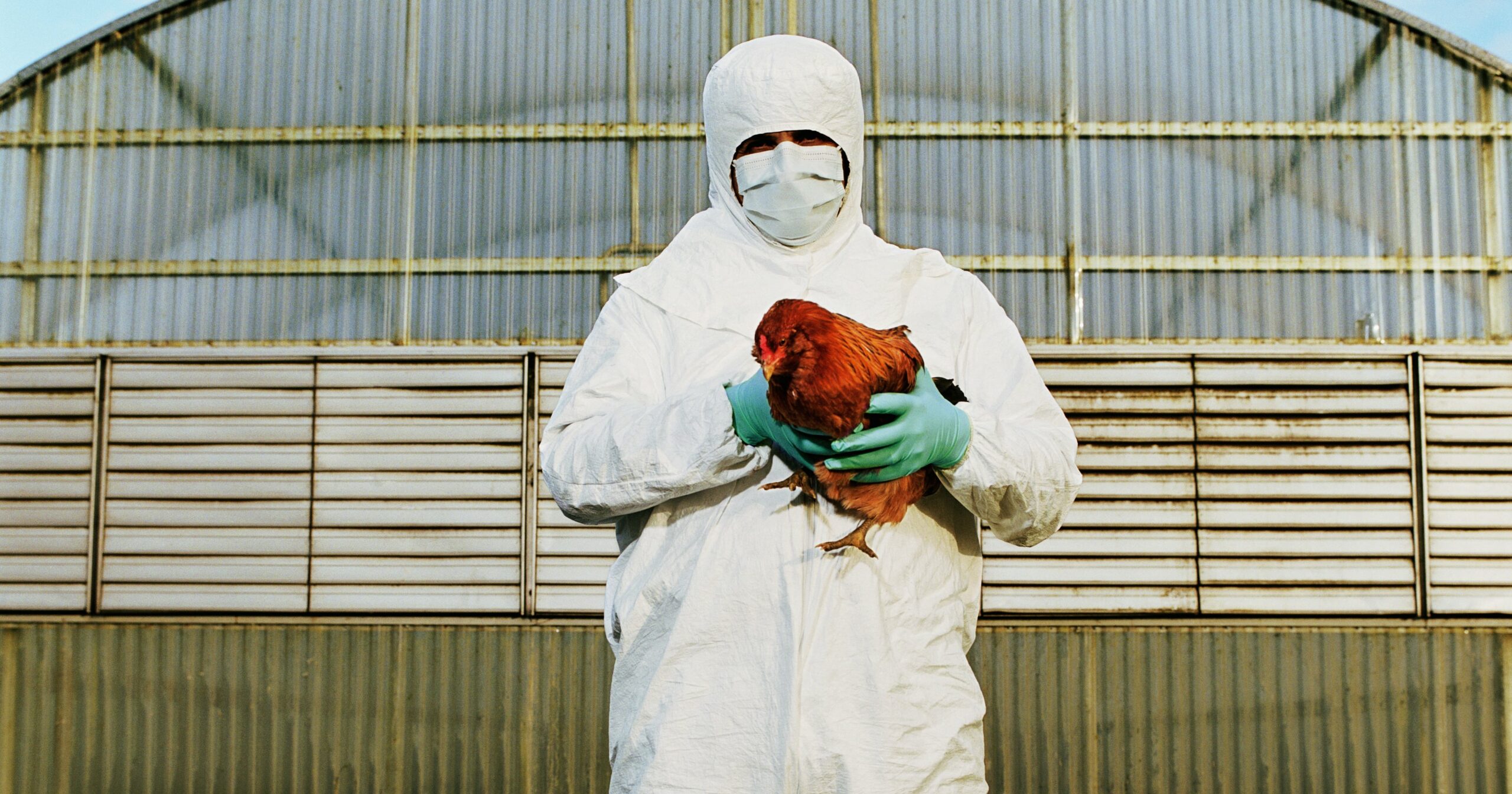Spring has sprung, and with it, so has the bird flu. A viral strain of avian influenza arrived in the United States in early 2022 and has since affected more than 58 million commercial poultry and backyard flocks, according to the Centers for Disease Control and Prevention (CDC). More recently, on March 25, the virus officially reached cattle, with unpasteurized milk testing positive for avian influenza in Texas, Kansas, and possibly New Mexico, per the US Department of Agriculture (USDA). What’s more, two humans have also reported having avian influenza A(H5N1) in the United States, per the CDC, raising understandable concern among the population.
Still, USDA officials say commercial milk is safe to drink (thanks to pasteurization) and the risk to humans is reportedly low. Plus, dairies are still only using milk from healthy cows. “At this stage, there is no concern about the safety of the commercial milk supply or that this circumstance poses a risk to consumer health,” the USDA confirmed in an online statement. “Milk from impacted animals is being diverted or destroyed so that it does not enter the food supply.” As for the sick cows, which were most likely infected by “wild migratory birds,” bird flu is leading to symptoms like decreased lactation and low appetite. Officials say that farmers and veterinarians are being encouraged to closely monitor any additional cattle illnesses or potentially new cases.
Reuters reports that so many birds died from the disease in 2022, it became the worst avian-flu outbreak in US history – and if this cattle outbreak is any indication, it doesn’t seem to be stopping any time soon. In terms of the other animals affected by bird flu, a pet dog died from the virus in April 2023, according to a statement from the Canadian government. The news came as a solemn reminder to keep your pets away from dead wild birds and refrain from feeding them any raw meat from game bird and poultry.
The avian flu has also spread worldwide, impacting animals in Europe, Asia, and Africa, Reuters reports. Avian flu predominantly affects wild birds (especially waterfowl) and poultry (e.g. chickens, turkeys, pheasants, quail, domestic ducks, geese, and guinea fowl), according to the USDA. Direct exposure of farmed birds to wild birds (which are permanently infected) is a likely transmission route of the virus, according to the World Organisation for Animal Health.
While humans are not typically infected by the virus, Tedros Adhanom Ghebreyesus, director general of the World Health Organization (WHO), said “we cannot assume that will remain the case,” at a 2023 press conference. To stay informed and protected, experts say we should be aware of a few key pieces of information. Here’s everything you need to know about bird flu.
What Is Bird Flu?
The CDC defines bird flu as “the disease caused by infection with avian (bird) influenza (flu) Type A viruses.” In animals, bird flu is deadly and contagious, and it naturally spreads “among wild aquatic birds worldwide and can infect domestic poultry and other bird and animal species,” per the CDC. The virus is transmitted through bird saliva, nasal secretions, and feces. Birds can also become infected if they make contact with a surface that’s been contaminated with the virus from another infected bird.
Can Humans Get Bird Flu?
Infectious-disease expert Amesh Adalja, MD, a senior scholar at the Johns Hopkins Center For Health Security, tells PS, “There is no current threat from bird flu to humans.” But that’s not to say that it couldn’t become a threat in the future. “So far, the virus does not show signs of having adapted to spread among humans, but more surveillance is needed,” Ghebreyesus said during a May 2024 press briefing.
That said, there have been a few instances in world history in which the virus has spread among humans. “The concern is that some strains of avian influenza will have or develop the capacity to spread efficiently between humans in the manner of the 1918 H1N1 influenza pandemic, which was an avian-origin influenza virus,” Dr. Adalja says. An estimated 500 million people, or one-third of the world’s population, became infected with the virus and roughly 50 million people worldwide died from it, per the CDC. In April 2022, the US reported its first human case of bird flu, according to NBC News.
Still, Dr. Adalja notes that when it comes to bird flu, “most of the strains are very constrained in their ability to infect humans, and infections are largely restricted to those who have close contact with bird species such as poultry.”
What Are Bird-Flu Symptoms in Chickens and Other Animals?
Infected cattle are reportedly experiencing low lactation and appetite. “We hadn’t seen anything like it before,” Texas Department of Agriculture Commissioner Sid Miller told AP News. “It was kind of like they had a cold.” If you’re concerned your bird or flock has been impacted by avian flu, here are a few signs and symptoms you should look out for, according to the Department of Labor’s Occupational Safety and Health Administration (OSHA):
- Lack of energy, appetite, and coordination
- Purple discoloration or swelling of various body parts
- Diarrhea
- Nasal discharge
- Coughing
- Sneezing
- Reduced egg production and/or soft-shelled or misshapen eggs
- Sudden death
Are There Signs of Bird Flu in Humans?
Again, the risk of humans being infected with bird flu remains low. But symptoms in humans can run the gamut from red eyes or mild flulike upper-respiratory symptoms to fever, shortness of breath, body aches, and even pneumonia, per the CDC.
If you come in contact with infected birds and become sick within 10 days of exposure, the CDC advises that you isolate at home and notify the local or state health department. Lab testing is needed to confirm a diagnosis. Treatment typically includes antiviral medicine, such as oseltamivir (Tamiflu) or zanamivir (Relenza), according to the Mayo Clinic.
The best prevention method against bird flu is to avoid exposure altogether. A few preventative guidelines from the CDC include:
- Avoid direct contact with wild birds, and observe them from a distance.
- Avoid unprotected contact with domestic birds that look sick or have died.
- Do not touch surfaces that may be contaminated with saliva, mucous, or feces from wild or domestic birds.
- If you must handle sick birds because of your job, use safety measures like gloves, eye protection, and frequent handwashing.
Should You Stop Eating Poultry, Eggs, or Milk?
No. “This is not something transmitted by ingestion of poultry or eggs,” Dr. Adalja says. Avian influenza is not a food-borne illness, meaning poultry and eggs that are properly prepared and cooked are safe to eat, per the USDA. Proper food-handling recommendations include cooking poultry to an internal temperature of 165°F and washing your hands with warm water and soap before and after handling poultry and eggs. Even with the most recent cattle outbreak, USDA officials say pasteurization remains effective at eliminating bacteria and viruses, including avian influenza (although this is a timely reminder to avoid raw or unpasteurized milk). The USDA says testing from the National Veterinary Services Laboratories also did not detect any “changes to the virus that would make it more transmissible to humans, which would indicate that the current risk to the public remains low.”
While eating these foods may not be a problem, buying them could cost you. The price of eggs has skyrocketed due to the avian flu, so much so that the average cost of a dozen large Grade A eggs in January 2023 was $4.82, according to the US Bureau of Labor Statistics. In comparison, in January 2022, eggs were only $1.93 a dozen. The price of milk is not expected to fluctuate this same way, but only time will tell.
– Additional reporting by Chandler Plante
Alexis Jones is the senior health and fitness editor at POPSUGAR. Her passions and areas of expertise include women’s health and fitness, mental health, racial and ethnic disparities in healthcare, and chronic conditions. Prior to joining PS, she was the senior editor at Health magazine. Her other bylines can be found at Women’s Health, Prevention, Marie Claire, and more.
Chandler Plante is an assistant editor for POPSUGAR Health & Fitness. Previously, she worked as an editorial assistant for People magazine and contributed to Ladygunn, Millie, and Bustle Digital Group. In her free time, she overshares on the internet, creating content about chronic illness, beauty, and disability.




